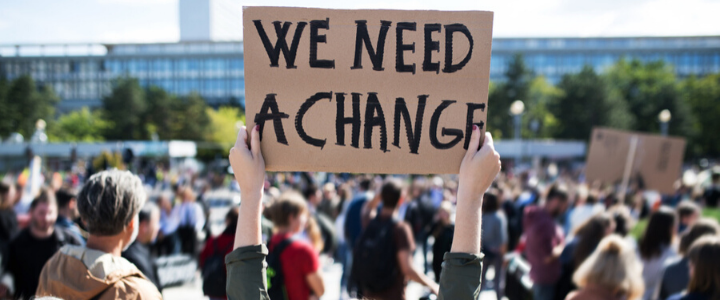The televised murder of an unarmed black man, George Floyd, has sparked something inside all Americans. Many have mourned, others have marched, and some have shown solidarity through monetary donations. The sheer number of individuals that are feeling called to act is historic and frankly, awe-inspiring. As a black woman and mother to 3 black children, I’ve never been seen in this way before. It is heartening to know that others are waking up to the injustices that have plagued our nation for centuries and that the status quo is no longer acceptable.
As educators, we see this tragedy, the renewed social justice movement and think, What can I do? Our hearts ache for our students, many of whom have not been able to process their feelings with peers and trusted adults at school. We want to understand, offer support, and make sustainable changes. Many educators I’ve connected with have been seeking resources that they can draw on over the summer to build their knowledge of the roots of systemic racism, white supremacy, white privilege, and social justice movements like Black Lives Matter. They are in desperate need of guidance on how to start these courageous conversations with colleagues and students that lead to real systemic change.
We hope the list of resources we’ve gathered below can offer you a pathway towards personal understanding and guide your planning as you dig into this important work for and with your students.
Systemic Racism
UNDERSTAND:
- When Educators Understand Race and Racism— Examines what becomes possible when educators understand race and racism.
- Segregated by Design— This eye-opening short film examines the forgotten history of how our federal, state and local governments unconstitutionally segregated every major metropolitan area in America through law and policy.
- 10 Things Every White Teacher Should Know When Talking About Race— Blogger and Author Angela Watson breaks down her 10 suggestions to help white teachers navigate tough conversations about race.
ACT:
- The Concept of Race Lesson from Facing History— In this lesson, students define and analyze the socially constructed meaning of race, examining how that concept has been used to justify exclusion, inequality, and violence throughout history.
- Teaching Strategies to Support Critical Thinking and Dialogue— These activity ideas can be applied to any topic to support deeper thinking and constructive discussions.
White Privilege and White Supremacy
UNDERSTAND:
- Why Talk About Whiteness?— Directed at white readers, this article stimulates dialogue about whiteness and helps the reader move from defensiveness, denial, guilt and shame, toward a place of self-empowerment and social responsibility.
- What Is White Privilege, Really?— Understanding the historic origins of the term and its impact on systems is a prerequisite to any anti-bias work.
- Cracking the Codes: Joy DeGruy “A Trip to the Grocery Store— This short video shows how one woman uses her white privilege to stand up to systemic inequity.
ACT:
- You and White Supremacy: A Challenge to Educators— Learn about author Layla Saad’s work to guide readers through a challenging examination of white supremacy in their lives.
- Look over the graphic Overt and Covert White Supremacy and reflect on your past, current thoughts/beliefs, and implications of these convictions.
Policing in America
UNDERSTAND:
- American Police— Learn about the origins of American policing and how those origins put violent control of Black Americans at the heart of the system.
- The School-to-Prison Pipeline— Find out how schools are increasingly becoming a gateway to the criminal justice system and ways that you can interrupt the pattern.
- Pushout: The Criminalization of Black Girls in Schools— This documentary takes a closer look at the educational and disciplinary disparities facing black girls in school.
ACT:
- Policing in America: Using Powerful Topics and Tasks to Challenge, Engage, and Empower Students— Watch as a group of high school students read complex texts about policing in America in preparation for an academic discussion.
- Teaching “The New Jim Crow— Teach the powerful text by Michelle Alexander using this complete curriculum guide for grades 9-12.
Racial Justice Movement
UNDERSTAND:
- Why Teaching Black Lives Matter Matters, Part 1— Learn the basic facts about the movement’s central beliefs and practices.
- Just Mercy— Now available FREE on You Tube, this 2020 film tells the true story of author and Harvard educated lawyer Bryan Stevenson’s journey to fight an unjust legal system.
- Mass Incarceration Podcast— This 50-min podcast outlines the origins of the U.S. criminal justice system and how racism has shaped our culture of mass incarceration in America.
ACT:
- Bringing Black Lives Matter Into the Classroom, Part 2— This article brings the movement to the classroom opening the door to larger conversations about truth, justice, activism, healing, and reconciliation.
- Social Justice Standards— This leveled set of anchor standards and age-appropriate learning outcomes provides a common language and organizational structure to help guide curriculum development, and ensure schools are more just, equitable and safe.






